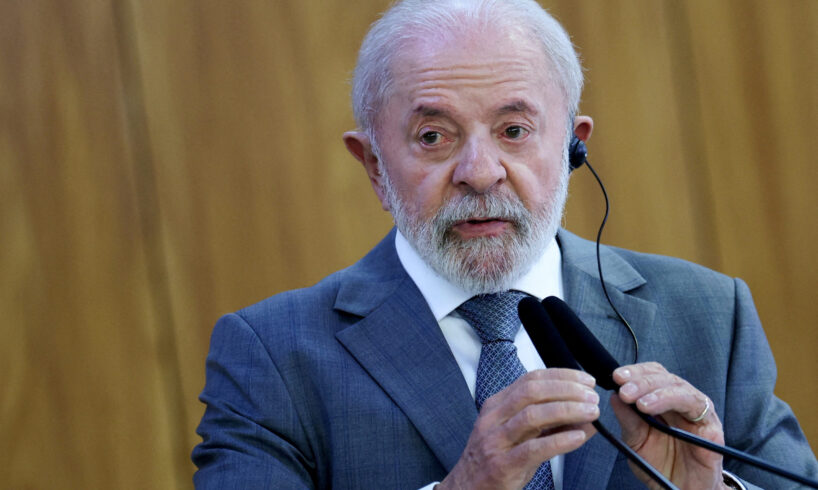
On Wednesday, US President Donald Trump threatened to levy 50 percent tariffs on imports from Brazil effective August 1. So far, this is the highest tariff rate the Trump administration has threatened this week, and it marks a major escalation from the baseline 10 percent announced on “Liberation Day.” The reasoning appears to be mostly political. In Trump’s letter to Brazilian President Luiz Inácio Lula da Silva announcing the planned tariffs, the US president noted the close relationship he had with former President Jair Bolsonaro, who is on trial for allegedly attempting a coup. Trump also mentioned Brazilian regulations on social media as factoring into this thinking. On the economic front, Trump characterized the trade relationship between the United States and Brazil as unfair—a somewhat surprising description, especially as the United States runs a trade surplus with Brazil.
Now, the question is if and how the Lula administration will respond.
The bilateral economic relationship
The United States has run a trade surplus with Brazil for the past fifteen years. It is Brazil’s second-largest trading partner, and a significant foreign investor. According to the Office of the US Trade Representative, in 2024, the United States had a surplus of trade in goods with Brazil of $7.4 billion, which represents a 31.9 percent increase over 2023 data. April 2025 data indicate that the US surplus of trade in goods with Brazil holds for 2025 as well. Brazil is a top exporter to the United States of goods including wood products, coffee, iron, steel, and sugar. When looking into trade of services, 2025 data show an even larger US trade surplus with Brazil, accounting for $7.2 billion, just in the first quarter of the year.
In 2022, Brazil was the largest source of foreign direct investment (FDI) into the United States from South America and, according to US estimates, the Brazilian stock of job-creating FDI in the United States stood at $30.6 billion. These numbers offer important context, but Trump’s planned tariffs might be driven as much or more by underlying geopolitical considerations. Although the United States is Brazil’s second largest trading partner, China is number one. And the timing of the tariff announcement is particularly interesting; the announcement comes just days after Brazil hosted the annual summit of the BRICS group of emerging economies. Trump has often criticized the group, and a few days ago, he threatened to impose tariffs against other countries that support what he called the bloc’s “anti-American policies.” Trump now may be seeking to make an example of Brazil.
The politics and the potential consequences
A large portion of Trump’s letter focused not on the US-Brazil trade relationship, but on Bolsonaro’s trial. Trump was referring to an ongoing trial related to the antidemocratic attacks on January 8, 2023, when far-right supporters of Bolsonaro stormed federal government buildings, including Congress, the presidential palace, and the Supreme Court. Bolsonaro is a defendant in this case and the extent of his involvement as the leader of what is seen as a coup attempt is being adjudicated. Since the January 8 uprising, Bolsonaro was convicted of abusing his presidential powers, making him ineligible to run for political office until 2030. A probably unintended consequence of these tariffs for Brazilian domestic politics? Trump might have just given Lula what he needed ahead of next year’s presidential elections in Brazil: greater political backing.
Lula won the 2022 presidential election over Bolsonaro by a mere 0.9 percent of the vote. And the country’s political divisions are reflected in his approval ratings so far, which sit around the 47 percent mark. Predictably, both Lula’s supporters and detractors are using the US tariff threats for their political gain. Bolsonaro and his supporters are blaming Lula for not avoiding these tariffs. Meanwhile, Lula and his base are blaming Bolsonaro and his son, Eduardo Bolsonaro—who has lived in the United States since February 2025—of acting against Brazilians’ interests.
Will Lula retaliate?
The short answer is probably yes.
Historically, Brazilians do not accept foreign interference in their domestic politics, and the tariffs tied to Bolsonaro’s trial and Brazil’s regulation of social media platforms might be seen as just that. The consequence might be a convergence of public support around Lula for retaliating in the name of defending Brazil’s sovereignty and national interests.
But Brazilian foreign policy has also historically been based on peaceful dialogue and diplomatic negotiations.
Brazil and the United States celebrated two hundred years of friendly and strategic diplomatic relations in 2024. And Lula and the Brazilian Foreign Ministry won’t put that in jeopardy. Geraldo Alckmin, the vice president and minister of trade and development, has already indicated the diplomatic route as a first step. But Lula has some leverage to raise the tone and pressure in negotiations.
It is very unlikely that the tariffs will change the course of the ongoing trials on the attempt against Brazilian democracy on January 8, 2023. It is also unlikely that they will significantly impact Brazilian regulations of social media platforms, as there is significant public support for those policies. Given that, how can Brazil negotiate this rate down before it goes into effect on August 1? First, with dialogue and diplomatic measures.
On the evening of July 9, Lula called an emergency meeting with key ministers, including Alckmin, the minister of foreign affairs, the minister of finance, and the minister of communications. Lula has already indicated that he could use a new law, called the Lei da Reciprocidade Econômica, to retaliate. This law gives the executive branch in Brazil the legal grounds to use tariffs as a retaliation tool. The president could potentially impose tariffs on goods and services against specific countries, suspend agreements and trade obligations, and, in exceptional cases, suspend intellectual property rights.
If Brazil does move ahead with tariffs against the United States, they would likely not be reciprocal. Lula is more likely to target specific products and services, such as US ethanol, which was an already contentious matter in the US-Brazil trade relationship, and mentioned in an April White House fact sheet as an example of unfair trade practices. He could also target intellectual property and the pharmaceutical industry or tax the profits that US companies aim to repatriate from Brazil.
Lula now has until August 1 to negotiate with the Trump administration before the tariffs go into effect. Despite not aligning politically, both Lula and Trump have experience leading the two most important economies in the Western Hemisphere. Both countries have a long history of diplomatic relations and are economic and geopolitical partners. Brazil will insist on its sovereignty but will be willing to negotiate and find common ground toward a more mutually favorable economic relationship with the United States. The question remains whether economic negotiations will be enough for Washington.
Ricardo Sennes is a nonresident senior fellow at the Adrienne Arsht Latin America Center and founder and executive director at Prospectiva Public Affairs Lat.Am, a consulting firm in Brazil.
Valentina Sader is deputy director and Brazil lead at the Adrienne Arsht Latin America Center.
Trump Tariff Tracker
Further reading
Image: Brazil’s President Luiz Inacio Lula da Silva speaks during a joint press statement with Indonesia’s President Prabowo Subianto (not pictured) at Planalto Palace in Brasilia, Brazil July 9, 2025. REUTERS/Adriano Machado





